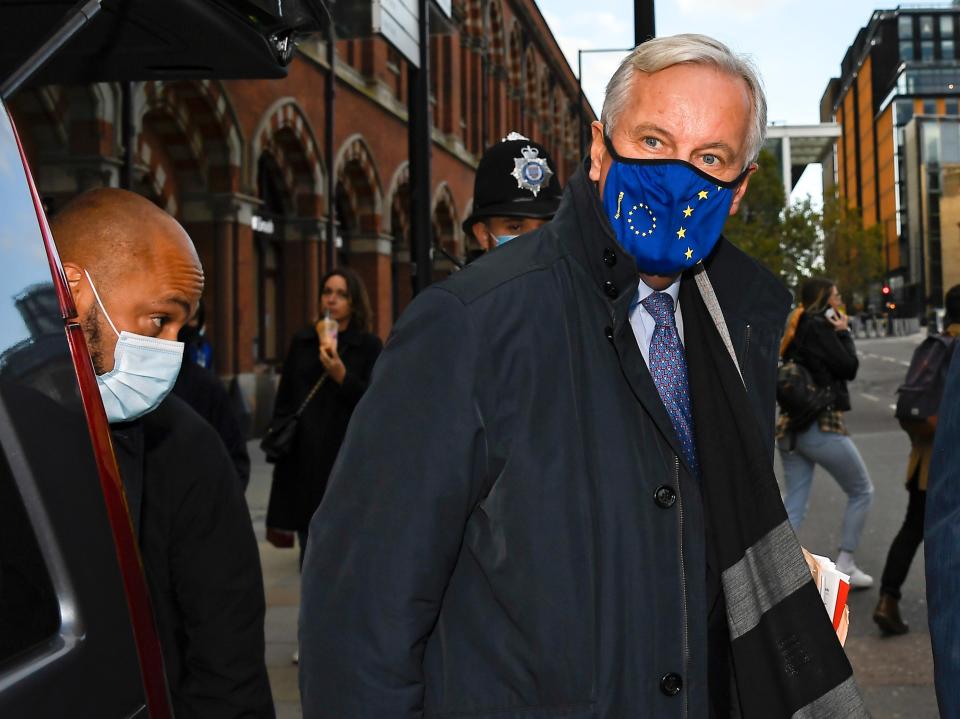Brexit: Barnier arrives in London as ‘intensified’ talks resume with clock ticking on no-deal

Brexit envoys for Westminster and Brussels have entered an “intensified phase of talks” following calls from across the channel for compromise on trade issues.
The bloc’s chief negotiator Michel Barnier arrived in the UK capital on Thursday evening donning a face mask bearing the blue and gold flag of the EU after having made conciliatory signals to his UK counterpart Lord Frost as the deadline for
However despite reports of a change in tone from the EU, Number 10 has insisted “significant gaps” remain between the two parties - and that it is “entirely possible that negotiations will not succeed”.
The negotiations have been in limbo after Boris Johnson’s previous deadline for an agreement passed last week - with both sides having spent months divided on issues including fishing access and state aid rules, as well as how any deal might be governed.
Both sides had previously said a deal would need to be reached by mid-October in order to allow time for ratification - however pressure remains to have any accord agreed upon in time for the 31 December end to the transition period.
Meanwhile the government was handed a symbolic defeat in the lords over the lack of enshrined protections afforded to EU citizens eligible to remain in the UK after the end of the Brexit transition period.
Referring to the resumed Brexit negotiations between London and Brussels, the Prime Minister’s official spokesman told a Westminster briefing: “In terms of the timeframe, I think, what I would say is that time is now very short.
“We have been repeatedly clear that any agreement needs to be in place before the end of the transition period.”
Meanwhile Mr Barnier has indicated the EU was willing to make compromises - but only if Mr Johnson also agreed to give ground.
Mr Barnier told the European Parliament on Wednesday: “Our door remains open.
“It will remain open right up until the last day when we can work together.”
But he said “it takes two to make a deal”, adding: “We are not sure that’s the outcome we will obtain and that’s why we need to be ready to deal with the consequences of a possible no-deal scenario.”
Downing Street said the UK’s position had been set out by Mr Johnson and Michael Gove, who had been clear the EU had to be serious about talking intensively, on all issues, and bringing the negotiation to a conclusion, as well as accepting that it was dealing with an “independent and sovereign country”.
A Number 10 spokesman said: “We welcome the fact that Mr Barnier acknowledged both points… and additionally that movement would be needed from both sides in the talks if agreement was to be reached.
“As he made clear, ‘any future agreement will be made in respect of the decision-making autonomy of the European Union and with respect for British sovereignty’.”
If a deal is not possible, the UK will end the transition period “on Australia terms” - without a deal with its largest trading partner.
The spokesman said: “It is clear that significant gaps remain between our positions in the most difficult areas, but we are ready, with the EU, to see if it is possible to bridge them in intensive talks.”
An Opposition motion regretting that regulations did not provide “clear statutory protection” for such residents during a so-called “grace period” next year was backed by 261 votes to 252, a majority of nine.
Just two days prior the lords had inflicted a similar non-binding defeat after voting to regret the controversial internal markets bill by a vote of 395 votes to 169 – the largest government defeat in the upper chamber for some 20 years.
The bill, which has sparked controversy since minister Brandon Lewis admitted it breached international law in a “specific and limited way” , has since been accused of undermining human rights legislation by parliament’s cross-party Joint Committee on Human Rights.
A report from the committee found argued that the legislation excluded ministers from their Human Rights Act duty to comply with Convention rights when making future regulations.
Additional reporting by agencies
Read more
Foreign rough sleepers to face deportation after Brexit
The UK risks losing its status as a leader in science after Brexit

